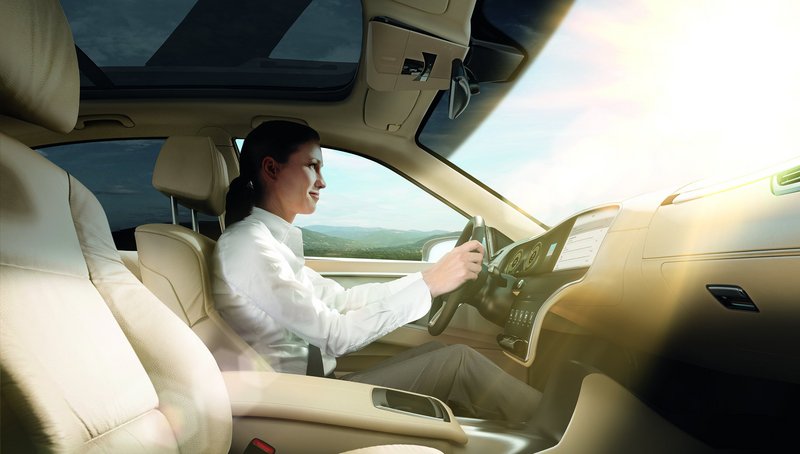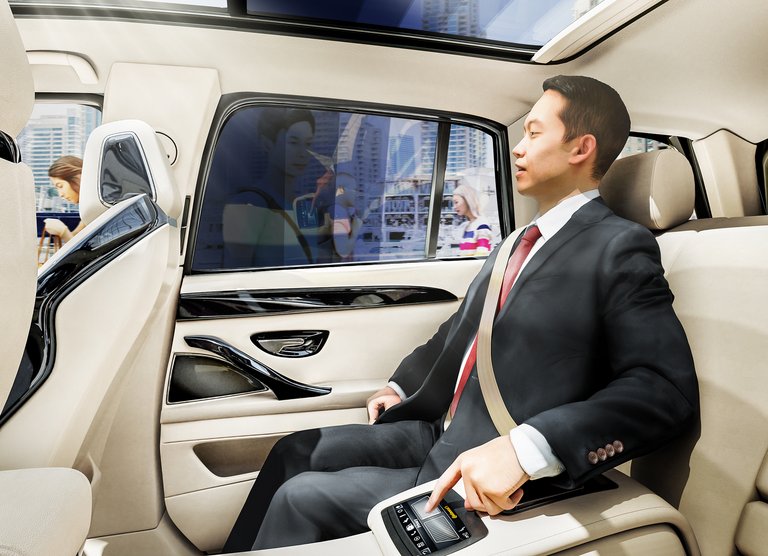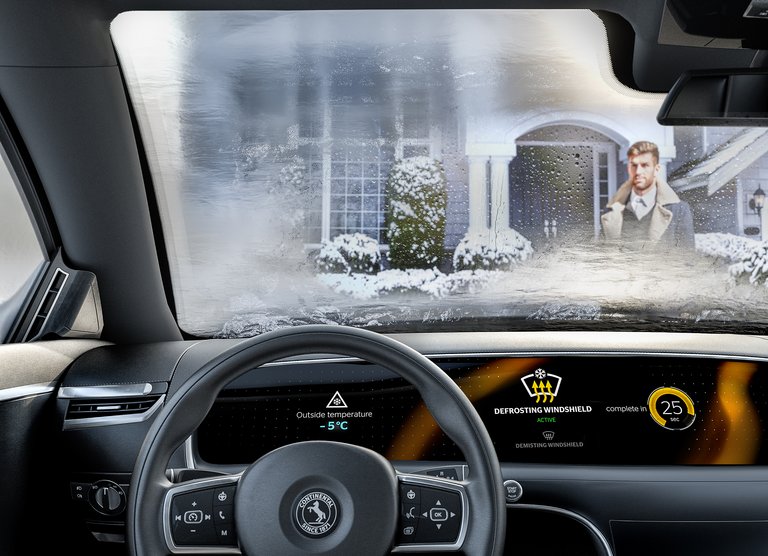Continental Enhances Intelligent Glass Control
- Intelligent Glass Control connects car windows with the on-board computer
- Unprecedented glass quality and automatic dimming thanks to the new “liquid crystal” film technology
- Car window becomes a digital interface for a range of functions
Regensburg, July 25, 2019. A modern car contains, on average, around five square meters of glass – almost twice as much as 30 years ago. While many components – from the inside mirror with a built-in tiredness sensor to the 3D speedometer – already function as high-tech, digitally connected components, car windows are large surfaces that are usually free from any kind of digital equipment, although they have tremendous potential – potential that Continental is increasingly looking to exploit. The technology company is enhancing and refining its Intelligent Glass Control solution, opening up whole new possibilities for greater comfort, safety and energy efficiency.
Thanks to new film technologies, panoramic sunroofs can be dimmed on command more effectively than ever before, sections of the windscreen can be tinted when the sun is low in the sky and the windows behind the B-pillar can be dimmed to provide more privacy on the rear seats. Windows can also be heated automatically without heating wires – and even be used as display surfaces. “Windows are becoming an increasingly active, smart component of the vehicle,” says Johann Hiebl, head of the Body & Security and Infotainment & Connectivity business units at Continental. “Intelligent Glass Control is an innovative solution that we are currently developing so that windows can be integrated even more effectively into the car’s user interface. This will make driving more comfortable and safer – and, thanks to new dimming and heating functions, they will also enable significant energy savings. This development work represents an important step on the road toward electromobility and autonomous driving.”
Intelligent Glass Control uses special films that are integrated into the glass and change their degree of translucency on the basis of electrical control signals. A range of technologies are available for this purpose, although they present benefits and drawbacks in terms of visual quality and the speed with which a glass pane can be dimmed. Smart windows have traditionally been used for panoramic sunroofs. But now, Continental is using – among other things – an innovative technology that is suitable for all the vehicle’s windows and significantly increases the potential of glass control: LC (liquid crystal) technology offers unprecedented quality for switchable glass in vehicles.
Greater privacy and fewer CO2 emissions
In an LC car window mold, liquid crystals mix with tiny paint particles in a special suspension that is, in turn, integrated into a fine film between two thin glass panes. Under the influence of a low AC voltage, the liquid crystals and paint particles align to either dim or lighten the windows. “This LC-based technology has the potential to enable the ultimate in modern, smart glass pane systems,” says Tobias Frischmuth, technical project leader in Intelligent Glass Control at Continental. “The transparency or opacity of a window can be adjusted within milliseconds. It is crucial that the windows do not exhibit any visible residual turbidity when they are transparent. This technology is also available in different colors.”
The overall benefits of switchable glazing technologies are remarkable – for example, each individual car window can be dimmed separately on command. Statutory regulations mean that this is not currently allowed on all vehicle windows, although the potential fields of use for future applications are many and varied. If the rear windows are dimmed to provide greater privacy in the rear, for example, this will also have a noticeably positive impact on the interior climate. This means that the air conditioning unit will not have to be used as much and CO2 emissions can be reduced. If the tinting function in the windshield is linked with the on-board power supply and cloud connection, specific sections of windows can be dimmed or brightened automatically in advance depending on the weather conditions or position of the sun. Not only will this technology mean that drivers will no longer have to reach for the sun visor – itself a risky move – it will ultimately render mechanical sun visors completely redundant. The technology also offers a range of benefits when it comes to thermal management: When connected with the locking system, the windows can be defrosted in winter as soon as the driver approaches the car.
The effectiveness of adaptive camera systems can also be improved thanks to Intelligent Glass Control. Adaptive camera systems are vital components for a wide range of autonomous driving functions and, if they are positioned close to the inside mirror, their function can be impaired when the sun is low in the sky. Thanks to Intelligent Glass Control, smart car windscreens will also play a role in human–machine interaction, for example by displaying information output by the advanced driver assistance and infotainment systems. Windows could also be transformed into smart displays featuring a range of touchscreen elements. Continental possesses both the electronics knowhow and systems expertise in the integration of innovative technology solutions necessary to make these visions a reality in the near future.
The ongoing development of Intelligent Glass Control goes hand in hand with the general trend in the automotive industry toward increasingly large glass surfaces. Few other synthetic materials have enjoyed such a long history as glass – and its appeal looks set to continue long into the future, too. What began 2,500 years ago with the robust glass chalice of an ancient Egyptian pharaoh has today become an important focus of research and development in the field of high-tech hybrid materials. Glass – in combination with liquid solutions, special crystals, nano particles, paint particles and, above all, smart and connected control technology – will in the future be one of the major drivers of innovation in the automotive industry.

Alena Liebram
Media Spokesperson Automotive Operations & Technology and Aftermarket
AUMOVIO


